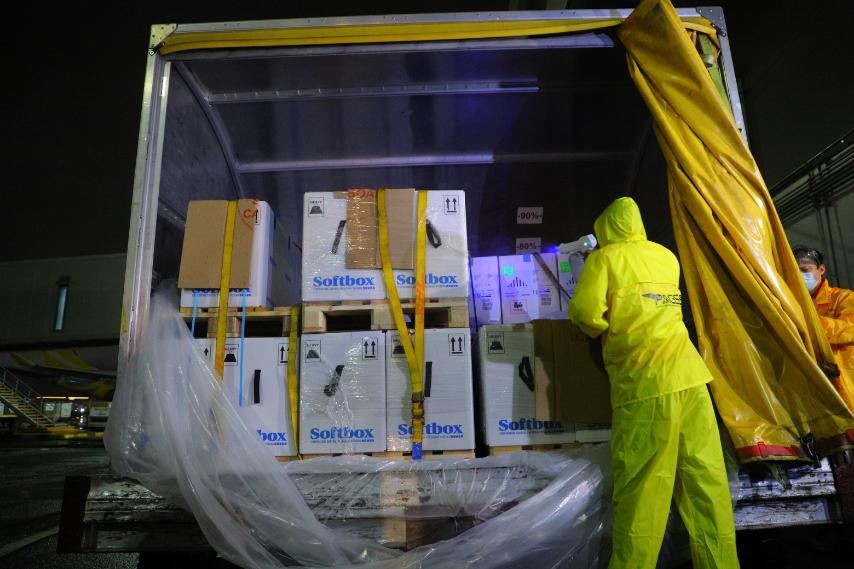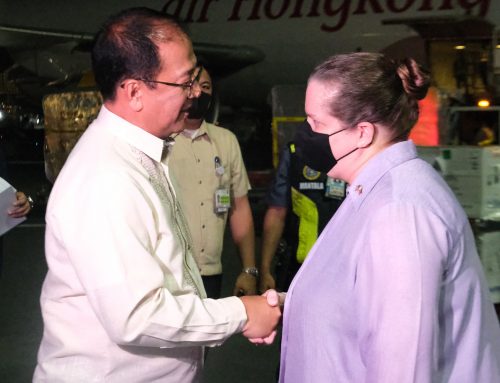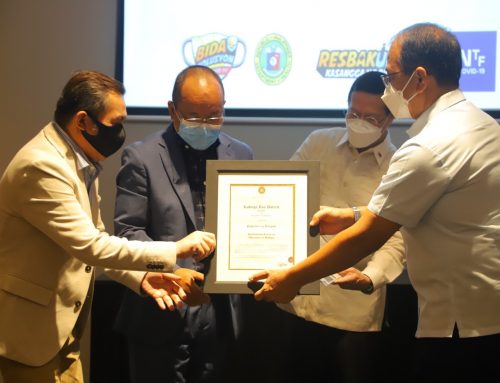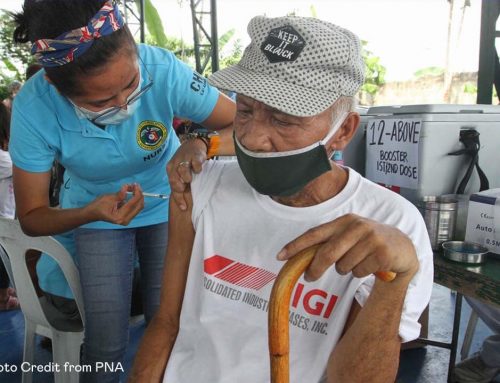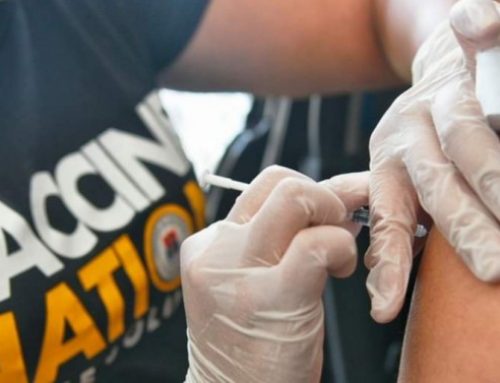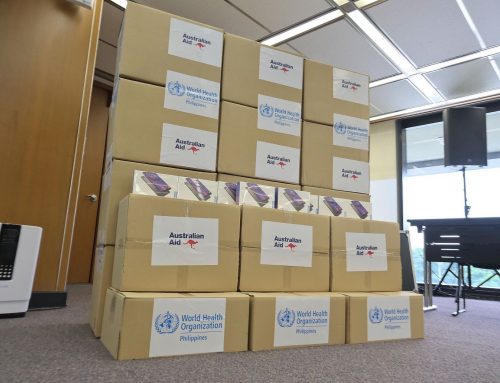NAIA, PASAY CITY — There is no let up in the deliveries of vaccines and the inoculations of Filipinos day and night, rain or shine, Secretary Carlito G. Galvez, Jr., National Task Force against COVID-19 chief implementer and vaccine czar, said as the country ramps up its vaccine program amid the threat of the Delta variant.
On Wednesday night, amid heavy rains, a DHL cargo plane carrying 562,770 doses of Pfizer anti-COVID vaccines arrived in the country.
The shipment is the first batch of the 938,340 doses the American pharmaceutical giant had promised to deliver this month, and part of the 40 million shots the national government had secured for this year.
The country expects the delivery of an additional 375,570 Pfizer doses on July 26.
The supply agreement signed by the Philippine government with Pfizer is so far the biggest deal the country has sealed with vaccine makers.
Pfizer is among the seven vaccine brands recommended by the vaccine expert panel and is part of the country’s vaccine portfolio.
Braving the rains
Residents of Metro Manila and other areas across the country braved the heavy downpour and lined up in vaccination centers to get the jab.
Despite the bad weather, the country was able to administer 337,349 vaccine doses nationwide on Wednesday, bringing the total doses administered to 15,953,911, of which 10,772,442 jabs were given as the first dose, while 5,231,469 were administered as the second shot as of July 21.
Glavez noted that the country’s high inoculation despite the inclement weather shows that Filipinos understand the value of getting vaccinated.
“Dapat tingnan ang brighter perspective. Nakikita natin na pumipila kahit na bumabaha, bumabagyo. Ibig sabihin gusto na ng tao na magkaroon ng vaccination,” Galvez said.
“Yung pagpila, normal ‘yan. Ngunit huwag nating isawalang bahala ang minimum health standards,” he said.
LGUs cold storage capacity
Galvez, however, stressed that highly-sensitive vaccines such as Pfizer which require ultra-low storage temperatures will only be given to local government units who are capable of properly handling and storing them.
Both Cebu and Davao will receive 51,480 doses each from the latest delivery. The remaining doses will be allocated for NCR and other areas which have high cases of COVID-19.
“Ang babagsakan nito ‘yung mga LGUs na nakita nating qualified na may cold chain solutions. Majority nito ay mapupunta sa NCR Plus 8 and also the LGUs that have the training to accept Pfizer and other vaccines with a requirement of ultra cold chain solutions,” Galvez said.
He warned that LGUs which do not have the capacity to store the vaccines and in the process mishandle them, would not be given additional supplies until such time that they have the capacity to do so.
Galvez emphasized that LGUs must therefore beef up their cold storage facilities by purchasing special freezers or partnering with reputable cold chain service providers in their area to prevent spoilage wastage.
“We have to treat the vaccines as a gold, parang ginto ito. They [LGUs] have to be careful in handling sensitive vaccines like Pfizer and with this kung sino lang talaga ang nakita natin na magaling na may third party cold chain solutions yun ang binibigyan natin,” he explained.
“Ang babala natin sa ating mga LGU na once na mayroon silang major defect na napanis ang ating bakuna, may possibility na talagang hindi na sila bibigyan ng mga sensitive na bakuna,” he added.
Galvez also expressed his gratitude to Pfizer-BioNTech, Philippine Ambassador to the United States Jose Manuel Romualdez, and the U.S. government for supporting the country’s inoculation program.
Latest Sinovac arrival
On Thursday, an additional 1.5 million doses of Sinovac vaccines arrived in the country.
Galvez said the Philippines has so far received a total of 16 million doses from the China-based vaccine maker, of which 14.1 million have been procured by the national government, 900,000 doses purchased by the private sector, and 1 million given as a donation.
According to the vaccine czar, the national government is currently formulating a “transition plan” that would enable the country to secure a stable and sustainable supply of anti-COVID vaccines beyond 2021.
“‘Yung 26 million para sa transition plan natin kasama na yung 6 million na J&J, 10 million na Novavax, and another 10 million na Sinovac. ‘Yun ang nakita namin na may available na supply. Just in case na mayroong available na mga Western brands, kukuha pa rin tayo,” Galvez said.
“We need to have an annual vaccination program. Hindi ito puedeng one-shot, big shot. Kailangan, it should be framed in a sense that it’s a multi-year plan until the elimination of the disease,” he explained.
Galvez said that this plan will be carried out in phases to ensure that it will be efficiently carried out.
“So ang plano natin is one, geographical setting ng population protection in order to contain the disease. Then ‘yung herd immunity para ma-achieve natin ‘yung complete downfall ng cases and very controlled,” he said.
“And then lastly, yung ating Exit Strategy which is disease elimination. So kailangan talaga phased, at the same time, multi-year plan,” he added.
Galvez gave the assurance that with the latest vaccine arrivals, the doses will be immediately deployed and equitably distributed to the regions and provinces nationwide.
“Nagkakaroon tayo ng equitable distribution, at the same time, meron tayong focus and expand. ‘Yun ang strategy natin,” he said.
“So meron tayong allocation sa NCR plus 8 and meron tayong equitable distribution sa mga provinces,” Galvez added.
Vaccine updates
As of July 22, the country has received a total 29,985,130 anti-COVID vaccine doses.
Out of these deliveries, 15.3 million were procured by the national government, 2.2 million were purchased by the private sector and local government units (LGUs), 10.2 million doses were COVAX-donated, and 2.1 million doses came from bilateral donations.
The Philippine government has secured a total of 164 million vaccine doses from different vaccine manufacturers for this year, which includes shots it has purchased as well as donations coming from the COVAX facility and other donor countries.
These doses are composed of 26 million government-procured Sinovac doses, 40 million Pfizer-BioNTech doses, 20 million Moderna doses, 17 million private sector and LGU-procured Astrazeneca doses, 10 million Sputnik V doses, 44 million COVAX-donated doses, 5 million doses from COVAX under a cost-sharing scheme, and 2 million doses donated by foreign governments.
The national government is also currently negotiating with Sinovac for an additional 10 million doses, with Johnson & Johnson for 6 million doses, and with the Serum Institute of India for 10 million Novavax doses.
Other officials who welcomed the arrival of the vaccines were Health Secretary Francisco Duque, III, DOH Usec. Carolina Vidal Taino, National Task Force Against COVID-19 adviser Dr. Ted Herbosa, Pfizer Philippines Country Manager Edilberto Reyes, and Pfizer Philippines Vaccine Category Lead Alet Gaw.###


